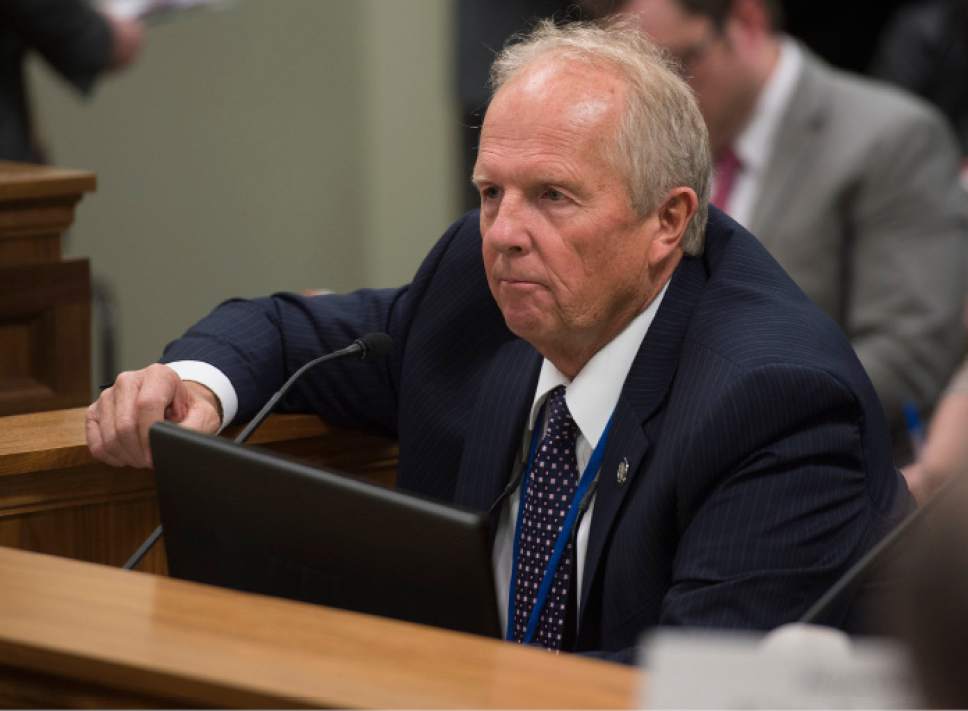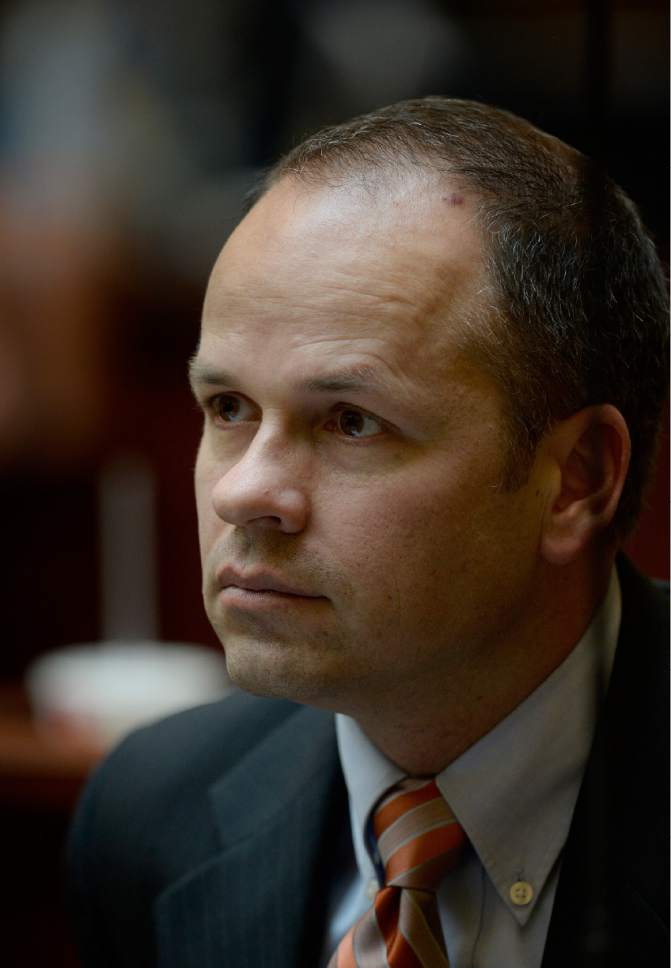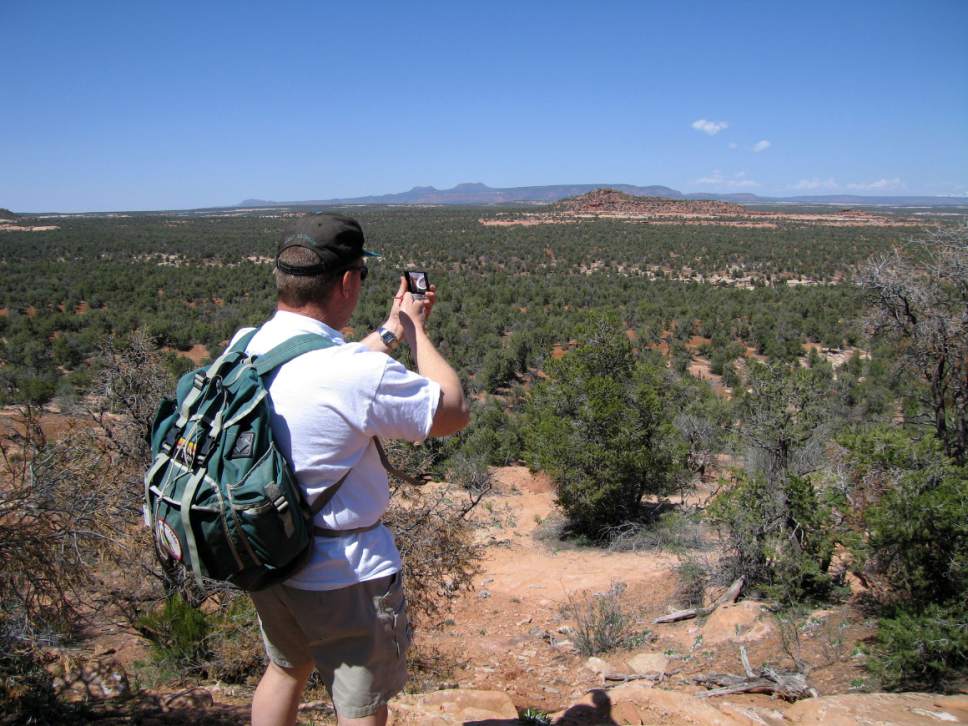This is an archived article that was published on sltrib.com in 2017, and information in the article may be outdated. It is provided only for personal research purposes and may not be reprinted.
Utah lawmakers are again considering several requests to fund legal and lobbying efforts directed at gaining greater state control over public lands and wildlife, including another $2 million to an anti-predator activist on retainer with the state to lobby on wolf and sage grouse.
Such requests entertained by the Natural Resources, Agriculture and Environmental Quality Appropriations Subcommittee totaled $4.6 million. On this list was a $500,000 request from a nonprofit called Foundation for Integrated Resource Management, or FIRM, that formed a few months ago to fight the Bears Ears monument designation, Recapture Canyon motorized restrictions and other federal land-use decisions that upset rural county leaders.
"Our organization is carrying out a mission to make sure that our public lands are open to integrated use and multiple use. We feel that it is best for the land itself and our economies," Johnnie Miller, FIRM's executive director, told lawmakers last week. "We are preparing legal actions as well, and assist our members, counties and non-profits and private corporation, to take legal action against federal agencies that put in place policies and procedures and implement actions that simply don't follow the law or the Constitution, as many of you know happens all too often."
Other funding requests include $100,000 to help Duchesne County litigate a losing fight with the Ute Indian Tribe over jurisdictional matters; $1.1 million to take over the management of wild horses and burros from the Bureau of Land Management; and $1 million to support the state's ongoing lawsuit to overturn federal land-use plan revisions regarding sage grouse.
The subcommittee prioritized these requests Monday in its recommendations to the Executive Appropriations Committee, putting the FIRM grant second from the top.
As has been the case for the past several sessions, Big Game Forever (BGF) is shaping up to be a big recipient of taxpayer dollars. Rep. Mike Noel, R-Kanab, is seeking another $2 million to fund the Department of Natural Resources' contract with BGF and its principal, Ryan Benson of Stag Consulting, but this time Noel was met with firm pushback from colleagues in his own party. Benson has been awarded $5 million since 2011, but he has yet to divulge any details about how BGF spends this money in its reports to the Legislature.
"I have questions whether we have seen progress based on the investments we made. We have no way of knowing how this significant investment has been used," said Rep. Timothy Hawkes, R-Centerville.
On Monday, Noel defended these expenditures, but remained mum on particulars.
"Some of these matters are sensitive. This is not something to be discussed in public. I think we got our money's worth. I really do," Noel told colleagues. His request expanded the current BGF contracts to include "other endangered species, national monuments and other items identified by the state."
This catchall language troubled Rep. Brian Greene, R-Pleasant Grove.
"If we are dealing with things that aren't part of the original contract, we need a new contract," Greene said.
Other requests were not shrouded in confidentiality. To justify a $100,000 appropriation for the Constitutional Defense Council, Sen. Kevin Van Tassell, R-Vernal, described difficulties Uinta Basin cities and counties face in defending claims brought by the Ute Indian Tribe. For decades the tribe has been returning to federal court asserting its jurisdiction over lands inside historic reservations covering Utah's share of the Uinta Basin. These reservation lands were opened up to white settlement a century ago, resulting in a confusing patchwork of cities, tribal lands and counties. Backed by numerous court rulings, the tribe claims jurisdiction over much of this 4-million-acre area.
The most recent ruling from the 10th Circuit Court of Appeals, penned by Supreme Court nominee Neil Gorsuch, forcefully rejected Myton's contention that the town's tiny footprint is not subject to tribal jurisdiction and removed District Judge Bruce Jenkins from the Ute case, which is still being actively litigated.
"We don't know if they will settle. Duchesne County and Myton have spent $1 million and they are out of money. This has to do with city streets opened up at the time of settlement," Van Tassell said. "It is evident we might need to continue to litigate. Hopefully that can be avoided, but if not we need the money to continue."
Noel is also behind the request for FIRM, which builds on $250,000 the Legislature put up last year, according to Miller, who also serves as CEO of the Utah Counties Indemnity Pool. That earlier grant went to another nonprofit called the Rural Utah Alliance, ostensibly to defend county officials who get into legal trouble for standing up to federal land managers.
On Monday, Noel pared the request to $400,000 and divvied it up into three separate grants: $150,000 to FIRM; $100,000 to the Rural Utah Alliance; and $150,000 for "rural sovereignty" grants, used by counties to challenge cuts to grazing levels on public lands.
FIRM is similar to another Utah nonprofit, American Lands Council, but without the emphasis on land transfer. At the urging of rural county commissioners, Utah Rep. Ken Ivory founded ALC to help states gain title to public lands, but Ivory no longer runs the organization, whose membership is eroding.
FIRM, by contrast, focuses on changing policies to ensure public land can be used to support rural economies.
"Our dedicated members love the lands of their heritage and are watchdogs against government agencies that would use their bureaucratic powers to close off public lands to responsible use," states the group's website. "We use contributions obtained from our donors to file legal actions and communicate with the public in a bold effort to stand up for responsible access of these lands."
Suing over President Barack Obama's Bears Ears designation, which set aside 1.3 million acres in San Juan County, is a top priority, even though Utah Attorney General Sean Reyes has already pledged to file such an action, Miller said.
According to Miller, FIRM will recoup its costs under the Equal Access to Justice Act, which awards such costs to nonprofits should they prevail in a legal action against the federal government. States and counties are not eligible to recoup costs under this law, which conservation groups often invoke in their lawsuits to reverse land-use decisions made by BLM or the Forest Service.
"I consider this an investment in the future for the people of Utah," Miller said. "When the Attorney General or San Juan County brings that action against the Bears Ears, that is money that is lost. We are coordinating with both on Bears and Recapture now. If we bring the action we will recover those costs and save that money so that Utah residents aren't paying for that action."
FIRM expects to sign up rural counties across the West to supports its efforts to "educate" the Trump administration, lobby Congress and pursue lawsuits.
"To create standing in front of the courts, we need as many counties as members as possible. We keep the membership fees low so we can get as many as possible," Miller said. "We see chapters of FIRM throughout the Western United States and revenue coming from throughout the West so it is not just Utah bearing the brunt. ... We are asking for this appropriation to get us through this year so counties can put us into their budgets [next fiscal year]."
Box Elder County Commissioner Stan Summers chairs the FIRM board, which includes former U.S. Rep. Chris Cannon, former state Rep. Mel Brown, Kane County Commissioner Dirk Clayson and Duchesne County Commissioner Greg Todd.
Twitter: @brianmaffly
Brian Maffly covers public lands for The Salt Lake Tribune. Brian Maffly can be reached at bmaffly@sltrib.com or 801-257-8713.
Twitter: @brianmaffly







